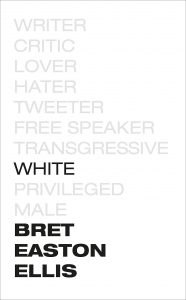Culture Wars
Bret Easton Ellis Nails Contemporary America
The Gen Xer whose satirical works include “American Psycho” and “Less Than Zero” also grasps the true essence of Donald Trump and our times in a way that eludes commentators on the Left and Right.

A review of White, by Bret Easton Ellis, Knopf. (April 16, 2019) 272 pages.

With his new book, White, Bret Easton Ellis not only takes on Hollywood and contemporary culture, he establishes himself as the voice of an overlooked generation. The Gen Xer whose satirical works include “American Psycho” and “Less Than Zero” also grasps the true essence of Donald Trump and our times in a way that eludes commentators on the Left and Right.
Unlike his previous seven books, White isn’t fiction. As it turns out, to parody the absurd times in which we live, fiction isn’t necessary. In American Psycho, Ellis critiqued 1980s New York culture through his invention of Patrick Bateman, a rich, beautiful, insincere, emotionally isolated investment banker by day and serial killer by night. No such literary device is necessary to satirize American life today. Like the rest of us, Ellis lives in world where “Everyone has to be the same, and have the same reactions to any given work of art, or movement or idea, and if you refuse to join the chorus of approval you will be tagged a racist or misogynist.”
The usual suspects aren’t pleased. The Guardian judged the work to be “a nonsensical, vapid book, written by a man so furiously obsessed with his right to speak that he forgets to say anything at all.” Vox gave the book one star, called it “boring,” and concluded it was “both ideologically uninteresting and aesthetically weak.” (The Vox reviewer declared in an aside, without irony, that “there is no such thing as non-political art”—a fine example of the Leninist politicization of everything and its impact on art that Ellis laments throughout the book.)
Unspoken but evident in these condemnations is Ellis’s most serious crime: He was seen as a man of the left, but is now somehow a convert despite essentially being the same person. American Psycho was controversial when it was published in 1991, and remains so today, but was and is largely seen as a criticism of the Reagan-era capitalist resurgence, and thus, of use to the Left. Turning the same unforgiving pen against today’s obsession with identity and victimhood is rather less helpful to progressives.

Despite not being primarily about politics—White is fundamentally a critique of recent art and culture—the book manages to capture something fundamental about Donald Trump that neither his detractors nor supporters appreciate. Ellis didn’t vote for Trump (or Hillary), isn’t a fanboy, and positioned Trump as Patrick Bateman’s false idol in American Psycho. But Ellis grasps that Trump’s biggest impact is as much cultural as it is political: “The building that had been inhabited by liberal identity-obsessed elitists was now, after eight years of an Obama hep-cat style and sensibility, being deconstructed—in fact, decimated—by disruptors who’d taken over and were playing by an entirely new set of rules. Not only that, but these disruptors were telling those confused by these new rules to go fuck themselves…”
To explain his transition from New Deal Democrat to conservative Republican, Ronald Reagan often said, “I didn’t leave the Democratic party, the Democratic Party left me.” Ellis, who has always perceived himself as a liberal, finds himself in a similar position: “I was now looking at a new kind of liberalism, one that willingly censored people and punished voices, obstructed opinions and blocked viewpoints. This illiberalism was becoming the alarming norm, in the media, in Hollywood, and for the moment nowhere more glaringly than on college campuses…”
Ellis rejects those who would deprecate or ban art because its producers are objectionable: “Whether it was de Sade’s brutality or Celine’s anti-Semitism or Mailer’s misogyny or Polanski’s taste for minors, I was always able to separate the act from its creator and examine and value it (or not) on aesthetic grounds.” He also noted, “I had never gravitated toward any kind of music because of the politics it does or doesn’t espouse: it’s a question of whether I like the tunes or not, that’s it.” Sadly, this is radical thinking in 2019.
Throughout the book Ellis takes aim at Millennials, whom he describes as “Generation Wuss,” and whose defining characteristics often seem to be neediness and anxiety.
Ellis defends Gen X, the generation between Baby Boomers and Millennials “who came of age during the one-two punch of the nihilistic ’70s and the rah-rah Reagan ’80s,” that gets little attention today, but which will run the country for the next twenty nears. Ellis opens the book with his own extreme examples of being a latchkey kid in Los Angeles of the ’70s and ’80s. He defends the resilience and nonchalance this hands-off parenting produced: “As a Gen Xer, rejecting, or more likely ignoring, the status quo came easily to me.”
His conclusion is that we could benefit from less of the insufferable emoting and groupthink afoot, and a little more perspective, and even detachment: “…when you’re roiling in childish rage, the first thing you lose is your judgment, and then comes common sense. And finally you lose your mind and along with that, your freedom.”






